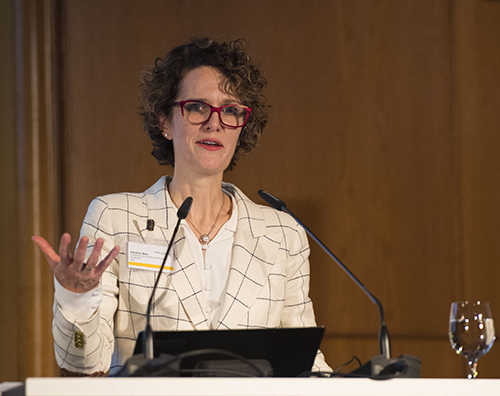Annelise Riles accepts lifetime achievement award in Berlin
...our urgent task is to rethink the purposes, character, and conditions for collaboration across foreignness of all kinds.”
Annelise Riles
Executive Director, Associate Provost for Global Affairs
On September 12, Executive Director Annelise Riles accepted the Anneliese Maier Award for lifetime achievement across the social sciences and humanities from the Alexander von Humboldt Foundation. The award was presented in Berlin by German Parliamentary State Secretary in the Federal Ministry of Education and Research, Thomas Rachel, and Enno Aufderheide, Secretary General of the Humboldt Foundation.
The role of the university in turbulent times
As part of the three-day symposium surrounding the awards ceremony, Riles delivered a keynote lecture “Knowledge and the Gift: The University in Turbulent Times,” stressing the importance of authentic, innovative, outward-looking international collaboration to solve complex global challenges:
 “Across the world, many societies seem to be taking an inward-looking turn. The rise of nationalism is coupled with anxiety about all things and persons foreign. Within the nation, a cultural schism increasingly divides experts and ordinary people. What is the role of universities in such conditions? If we look carefully, we find traces of analogous parochialism within the university: despite calls to globalize, universities remain remarkably local institutions. Despite calls for interdisciplinarity, intellectual silos still predominate. How must the university be transformed to meet the challenge of this moment?”
“Across the world, many societies seem to be taking an inward-looking turn. The rise of nationalism is coupled with anxiety about all things and persons foreign. Within the nation, a cultural schism increasingly divides experts and ordinary people. What is the role of universities in such conditions? If we look carefully, we find traces of analogous parochialism within the university: despite calls to globalize, universities remain remarkably local institutions. Despite calls for interdisciplinarity, intellectual silos still predominate. How must the university be transformed to meet the challenge of this moment?”
“I address this question from the vantage point of my discipline of anthropology, a discipline devoted to thinking creatively about and with foreignness. More specifically, my own research about the nature of legal expertise illuminates the strengths and limitations of expert knowledge. I consider the question of the future of the university alongside the foundational text in the anthropology of law–Marcel Mauss’ The Gift. From this vantage point, I suggest our urgent task is to rethink the purposes, character, and conditions for collaboration across foreignness of all kinds.”
About the Maier Award
The Maier Award is named after the German philosopher and science historian Anneliese Maier (1905–1971) and includes a prize of €250,000 to support international scholars in collaborative research in cooperation with specialist colleagues in Germany. Winners must be nominated by academic institutions in Germany, who then collaborate with the international prize winners on a multi-year project of their choosing. Riles will be working with the Max Planck Institute for Social Anthropology, Halle (Saale) to produce work in legal anthropology, which is still an emerging field in Germany.
“This award is such an honor, and I accept it with tremendous humility and gratitude to the Foundation and to the board that selected me,” says Riles. “It will make it possible for me to explore new problems and turn my research towards Europe. Up until now, my research has been focused mainly on the United States and Asia, and so I very much look forward to the opportunity to collaborate with European researchers and apply what I learn to my knowledge of the rest of the world.”
About Annelise Riles
Riles studies the transnational dimensions of law, markets, and culture, especially as they relate to cultural diversity, human rights, and women’s rights. She has conducted legal and anthropological research in China, Japan, and the Pacific, and speaks Chinese, Japanese, French and Fijian. She has published on topics including comparative law, conflict of laws, financial regulation and central banking.
She is also the founding director of the transnational, multilingual online platform Meridian 180, which brings together 800+ thought leaders from academia, business, and the public sector from 29 different countries to address major global challenges. Learn more about Riles.
